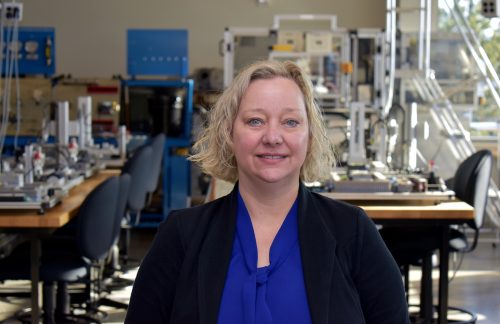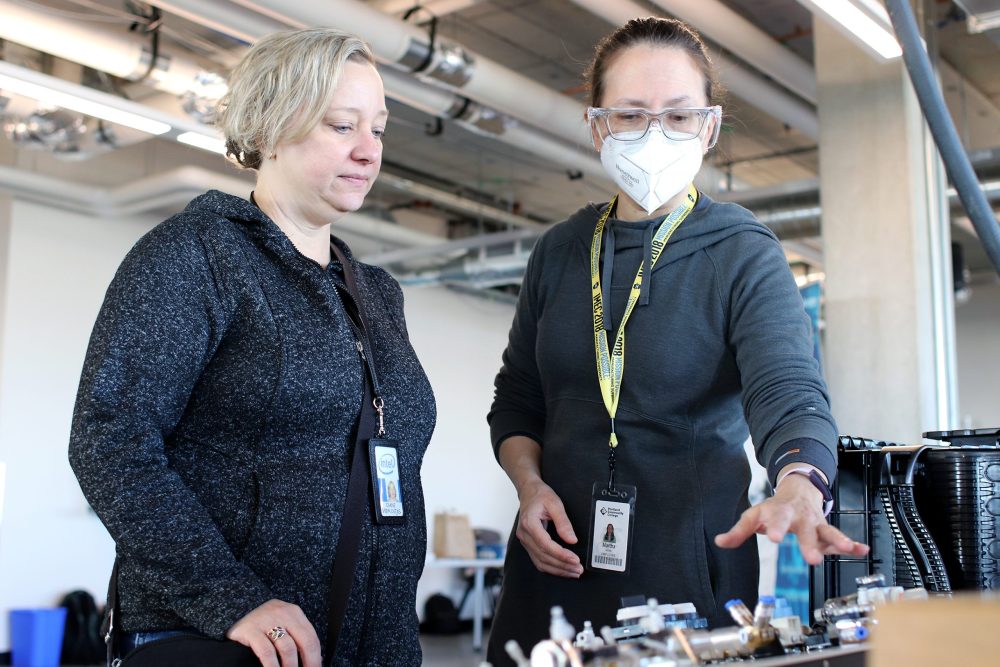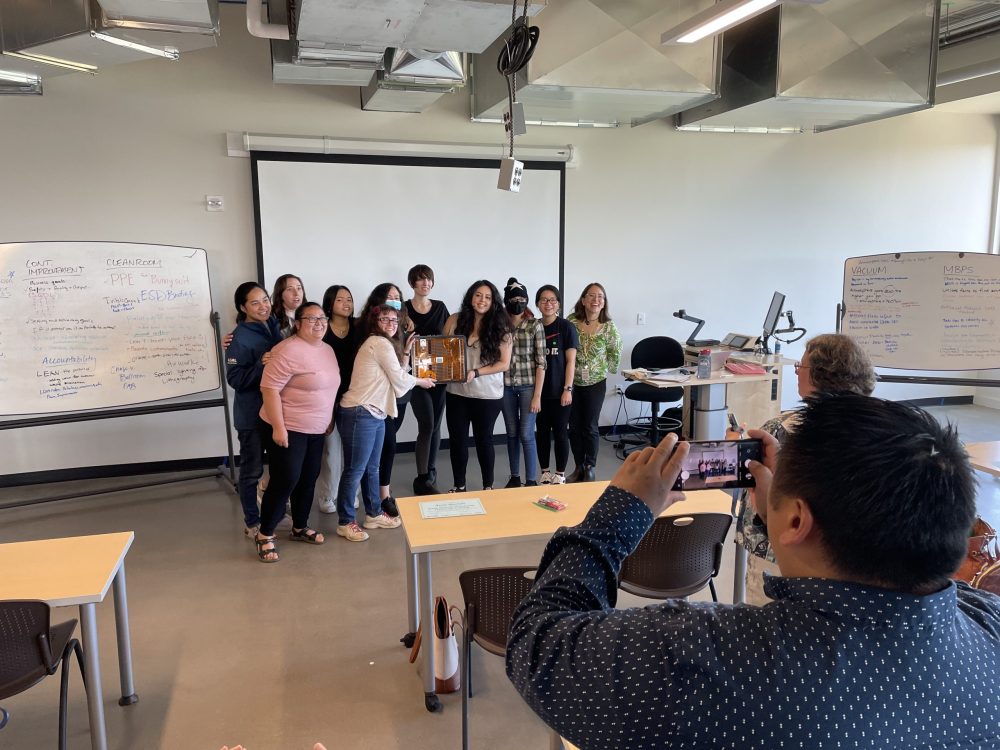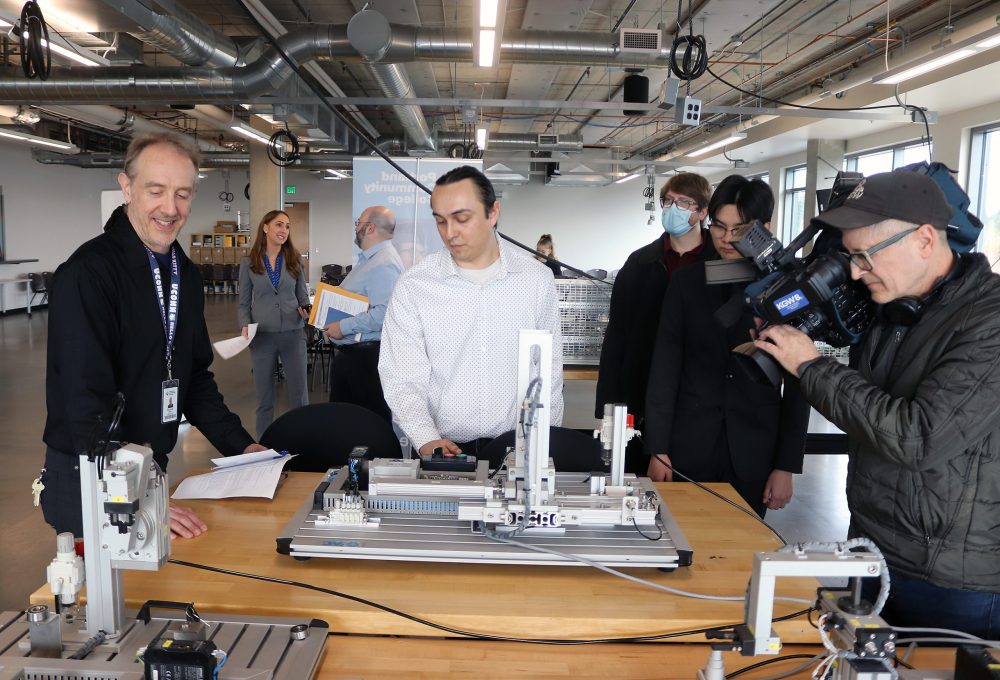Partner Q&A: Quick Start provides long-term results for semiconductor workers
Photos and story by James Hill
Diane Vidmantas knows all too well of a special program at Portland Community College. The Quick Start Semiconductor Technician Training Program started from a collective vision from Intel and community partners to support the semiconductor industry’s growing employment needs and spark interest in new career pathways among under-resourced communities.
By bringing in partners and funders like PCC, City of Hillsboro, Worksystems, Washington County, Intel Corporation, Oregon Future Ready and Higher Education Coordinating Commission, the on-ramp program became a reality in 2022. Quick Start is a 10-day intensive course designed to equip job-seekers with the necessary skills to secure entry-level technician positions with Intel and other semiconductor manufacturers in the area.
The success of this program is evident with an impressive 68% job placement rate, and a healthy waitlist. Since it began in late 2022, it has graduated 351 students with 78% of them women and students of color.
Quick Start is one of many examples of PCC and Intel’s partnerships. Other collaborations include the Microelectronics Technology Program and the Semiconductor Essentials Training, to name a couple. As a result of this and other efforts, Intel’s Returnship and Quick Start programs received the Catalyst Award from SPIE, the international society for optics and photonics, which recognizes companies for programs that have a positive impact on society.
We discussed with Vidmantas the vision for Quick Start and philosophy in supporting under-served communities and women through initiatives like this:
What prompted the development of Quick Start?
Diane Vidmantas: Quick Start was developed in response to the significant workforce shortage in the semiconductor industry in Oregon and nationally. The effort was prompted by the need to fill up to 10,000 new jobs in the Portland Metro region by 2032 and to address the lack of sufficient students pursuing STEM degrees required by the industry. Additionally, we are driven by Intel’s RISE goal to increase inclusive representation in technical roles.
How did this impressive list of partners come together for this cause?
Vidmantas: The partners, including the City of Hillsboro, Washington County, Intel, Worksystems, and PCC, came together recognizing the critical need for a skilled semiconductor workforce. We aimed to combine resources, expertise, and networks to create an equitable and efficient pathway into semiconductor careers, especially for underrepresented communities.
What were the primary obstacles and how did you overcome them?
Vidmantas: One of the primary challenges we have faced in establishing this program is ensuring that we are reaching and supporting underrepresented communities. The program overcame these challenges through targeted outreach, collaborating with 25 community-based organizations for recruitment and enrollment, and providing comprehensive support services and stipends to participants. We are proud to work with organizations such as Worksystems and WorkSource to leverage their expertise to reach a diverse group of individuals.
Why is it important to engage more women and under-served communities in accessing the semiconductor pipeline?
Vidmantas: The semiconductor industry is vital to the local and national economy, with a projected need for 1 million more jobs by 2032. Engaging more women and underserved communities is crucial for diversifying the workforce, filling the labor gap, and ensuring the industry’s growth and innovation.
Why is PCC a crucial partner for Quick Start?
Vidmantas: PCC is an excellent partner due to its experience in delivering technical education and training, its facilities for hands-on learning, and its commitment to community engagement and support. PCC’s infrastructure and expertise in career coaching and curriculum development make it ideal for hosting and executing the Quick Start program. Additionally, PCC hosts several Intel retirees as instructors, who have supported the program by teaching Quick Start classes.
Are there other initiatives that Intel and PCC collaborate on to help build a skilled workforce?
Vidmantas: Intel’s longstanding partnerships with PCC are pivotal in fostering a vibrant ecosystem to nurture the region’s future technology and manufacturing workforce. These collaborations are instrumental in achieving Intel’s IDM 2.0 and RISE 2030 goals by integrating with various PCC workforce programs and initiatives. We have collaborated with the college to support the creation and continuation of PCC’s Microelectronics Technology program established at Rock Creek in 1995, the development of a Semiconductor Academic & Career Pathway, and the emerging Center of Artificial Intelligence & Cultural Computing. Together, these programs are shaping Washington County into a hub for semiconductor manufacturing and AI expertise, offering comprehensive education, training, and career pathways to meet the industry’s growing demands.
Tell us about your journey to Intel?
Vidmantas: I have been at Intel for 28 years by way of Linn Benton Community College and Oregon State Industrial Engineering, which led me to New Mexico’s Intel site. While I spent most of my career as an industrial engineer with Logic Technology Development, the last five years have been in the Foundry Technology Development as a director of business operations. I have been fortunate to be in roles that kept me learning every day with a focus on collaborative problem solving. Being part of QuickStart has been one of the highlights of my career. Several years ago my son’s class was in a photo and post of their manufacturing day tours on Facebook. When I reshared the post, I commented on the fact there were no girls, and I needed to figure out how to influence that. When that memory popped up last year, I realized I have influenced the number of women in manufacturing through my engagement with Quick Start.
Have you used your own personal journey to inspire others to enter the semiconductor field?
Vidmantas: For the last several years I have shared my journey with teachers as part of their Portland Metro STEM Partnership Teacher Externship. I think it is important for teachers to understand the opportunities available so they can share them with students that do not have a family or friend in the industry. I ended up in engineering because of the influence of a high school teacher.
What does winning the Catalyst Award mean to you?
Vidmantas: I am very proud to be part of the team that partnered to create Quick Start and the Catalyst Award is an industry recognition of the program’s innovative approach to workforce development, its impact on diversifying the semiconductor industry, and its potential as a model for similar initiatives nationally.
Thank you, Diane!




